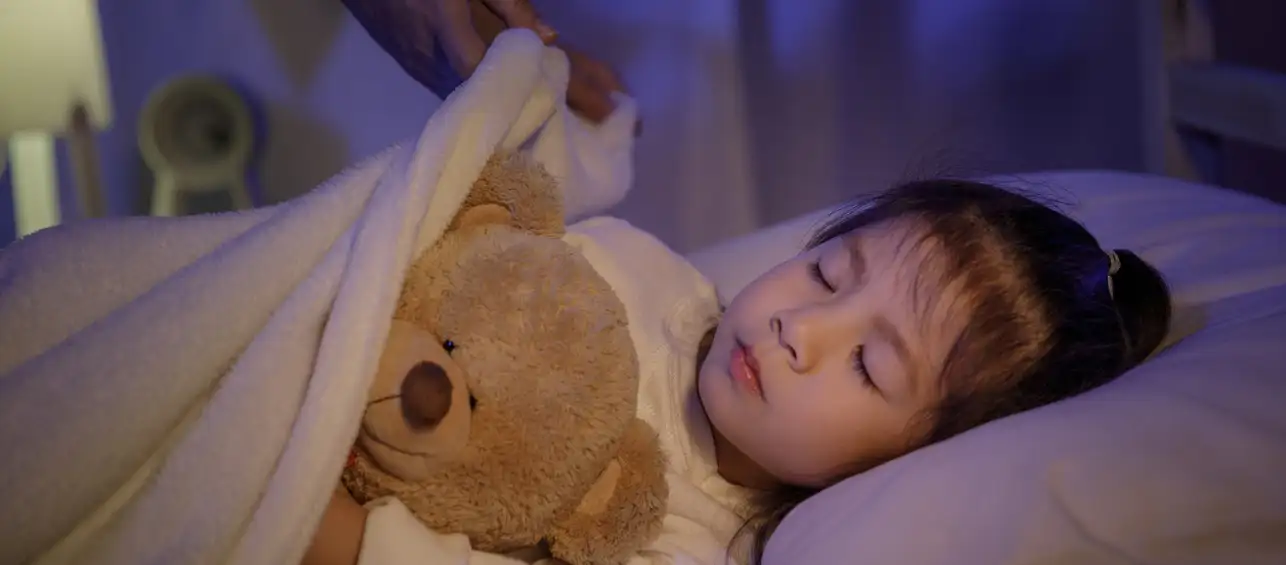As every parent can attest, the bedtime struggle is real! In fact, I don’t know a single parent, whether through my practice or via personal relationships, who hasn’t struggled with bedtime at some point during their kid’s childhood.
The sleep conversation is important to continue having though, because good sleep habits are vital to the health, growth and development of children.
And here’s a bonus: Research has shown that adding as little as 27 extra minutes of sleep per night for school-age kids makes it easier for them to manage their moods and impulses so they can focus on their schoolwork.
6 Tips to Help Kids Sleep Better and Longer
So how can your kids sleep better and longer at night? Use these six tips to help encourage healthy sleep habits in your home:
- Create a sleep-friendly environment. Too much light and a room that’s too hot or too cold can make it difficult to sleep. Hang light-blocking curtains over the windows and make sure the temperature is seasonally appropriate for your kids’ rooms.
- Turn off the electronics. Research is mounting about the light generated by computers, tablets and phones. Just 2 hours of screen time right before bed is enough to lower levels of melatonin, a chemical that signals the body to sleep, by 22 percent. Kids are twice as susceptible to “blue light melatonin disruption” as adults.
The American Academy of Pediatrics and American Academy of Sleep Medicine recommend that screen-based devices not be allowed in children’s bedrooms and not be used for 1 hour before bedtime. - Keep it regular. This may be the most difficult tip to implement, but it’s probably the most important. By keeping bedtime consistent, even on weekends, your child’s natural circadian rhythms will run uninterrupted, and your child will have better physical and mental functioning and, ultimately, better behavior because of it.
- Don’t rely on naps for older kids. This only makes it harder for school-age kids to get to bed at a reasonable time.
- Take time to wind down. Just like adults, kids need time to unwind mentally and physically before bed. Help your children establish a brief, relaxing routine that they can do every night—a few minutes of simple stretching, listening to mellow music, taking a bath, or drinking a glass of warm milk.
- Get the right amount. The saying “sleep begets sleep” is a true one. In short, it means a well-rested child is able to sleep better. How much is enough? Follow these guidelines from the National Sleep Foundation:
Infants (4-11 months): 12-15 hours
Toddlers (ages 1-2): 11-14 hours
Preschoolers (ages 3-5): 10-13 hours
School-aged (ages 6-13): 9-11 hours
Teenagers (ages 14-17): 8-10 hours
Younger adults (ages 18-25): 7-9 hours
Good Sleep Habits Are Vital to Overall Child Health
There are many reasons why good sleep habits are vital to overall child health. Deep sleep triggers the body to release the hormone that promotes normal growth in children and teens. This hormone also boosts muscle mass and helps repair cells and tissues in children, teens and adults.
When there is a deficit in sleep, ghrelin levels (hungry feeling) go up and leptin levels (full feeling) go down. That means kids feel hungrier when they’re tired and are likely to crave higher-fat and higher-carb foods.
Tired kids tend to be more sedentary, so they burn fewer calories. Research has shown that kids who participate in more vigorous exercise are able to fall asleep much faster than those with sedentary lifestyles.
And the most outwardly symptom of a poor night’s rest in kids is their behavior. Children who consistently sleep fewer than 10 hours a night before the age of 3 are three times as likely to have hyperactivity and impulsivity problems by age 6. The symptoms of ADHD, including impulsivity and distractibility, mirror each other almost exactly—so tired kids can be impulsive and distracted even though they don’t have ADHD.
Following the above tips can help kids have better quality of sleep and do it for longer periods of time. And research shows that children whose parents have healthy sleep environments are more likely to have kids with the same. Sounds like a good reason to turn in early!





Great advice from a great doctor.